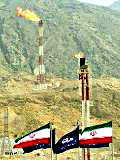 This story in the Gloucester Daily Times involving prosecution of a Rockport, Massachusetts man for, among other things, possession of a rocket launcher (only for protection against burglars, of course) has an interesting export law angle. The defendant, James Atkinson, is an emergency medical technician working for an ambulance company and owns a company called Granite Island Group, which apparently is involved in providing counter-surveillance consulting services and equipment.
This story in the Gloucester Daily Times involving prosecution of a Rockport, Massachusetts man for, among other things, possession of a rocket launcher (only for protection against burglars, of course) has an interesting export law angle. The defendant, James Atkinson, is an emergency medical technician working for an ambulance company and owns a company called Granite Island Group, which apparently is involved in providing counter-surveillance consulting services and equipment.
Rockport authorities, according to the newspaper article, first became aware of Atkinson when a Swiss company complained that Atkinson failed to deliver $32,000 of counter-surveillance equipment that it had ordered from Granite Island. This led to a larceny arrest, a home search, and, voilà , the discovery of the rocket launcher and other firearms.
Mr. Atkinson’s defense to the larceny charge was interesting. According to the newspaper article, he hadn’t shipped the equipment “because the firm didn’t supply him with proper export documents.” This is an odd defense, it it can be called a defense, because it’s not clear that surveillance countermeasures such as those being sold by Mr. Atkinson required an export license. ECCN 5A980 covers surreptitious listening devices but does not cover devices used to detect or disable such surreptitious devices.
Of course, even if export licenses were required and somehow could not be obtained, there’s still the issue as to why the purchase price wasn’t simply refunded. But that, of course, involves matters unrelated to my expertise and the subject of this blog, so I’ll let each reader speculate independently on this issue.
Naturally Mr. Atkinson was not going to sit around and let the city take his rocket launcher just because he was accused of welching on an export:
Atkinson filed a 653-page lawsuit against the town, Rockport Police, the Commonwealth of Massachusetts, and scores of institutions and individuals.
His lawsuit asks for, among other things, $175 million from the town. He has said the town violated his civil rights by entering his home and confiscating his firearms.
You might be surprised by the sheer length of the lawsuit, apparently only a few pages short of War and Peace, but that’s only if you are unaware of the binding legal precedent that requires that judgments always be granted in favor of the side that files the most paper in a proceeding.

 Posted by
Posted by  Category:
Category: 

 The White House signed, on November 19, Executive Order 13590, which increased the sanctions on foreign firms doing business in Iran. An official copy of the executive order has not been released but it is described in this “
The White House signed, on November 19, Executive Order 13590, which increased the sanctions on foreign firms doing business in Iran. An official copy of the executive order has not been released but it is described in this “ This blog
This blog  NJ-based
NJ-based  There was more fallout from the PPG case today. Xun Wang, who was the former manager of the Shanghai subsidiary of PPG,
There was more fallout from the PPG case today. Xun Wang, who was the former manager of the Shanghai subsidiary of PPG, 

